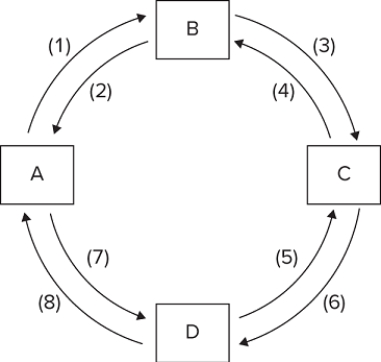Exam 2: The Market System and the Circular Flow
Exam 1: Limits, Alternatives, and Choices107 Questions
Exam 2: The Market System and the Circular Flow287 Questions
Exam 3: Demand, Supply, and Market Equilibrium151 Questions
Exam 4: Market Failures Caused by Externalities Asymmetric Information229 Questions
Exam 5: Public Goods, Public Choice, and Government Failure268 Questions
Exam 6: Elasticity399 Questions
Exam 7: Utility Maximization358 Questions
Exam 8: Behavioral Economics311 Questions
Exam 9: Businesses and the Costs of Production445 Questions
Exam 10: Pure Competition in the Short Run342 Questions
Exam 11: Pure Competition in the Long Run250 Questions
Exam 12: Pure Monopoly407 Questions
Exam 13: Monopolistic Competition279 Questions
Exam 14: Oligopoly and Strategic Behavior362 Questions
Exam 15: Technology, RD, and Efficiency309 Questions
Exam 16: The Demand for Resources359 Questions
Exam 17: Wage Determination168 Questions
Exam 18: Rent, Interest, and Profit305 Questions
Exam 19: Natural Resource and Energy Economics337 Questions
Exam 20: Public Finance: Expenditures and Taxes336 Questions
Exam 21: Antitrust Policy and Regulation264 Questions
Exam 22: Agriculture: Economics and Policy265 Questions
Exam 23: Income Inequality, Poverty, and Discrimination324 Questions
Exam 24: Health Care280 Questions
Exam 25: Immigration259 Questions
Exam 26: International Trade347 Questions
Exam 27: The Balance of Payments, Exchange Rates, and Trade Deficits318 Questions
Exam 28: The Economics of Developing Countries277 Questions
Select questions type
The market system is said to be characterized by "consumer sovereignty." This is because
(Multiple Choice)
4.8/5  (26)
(26)
The major virtues of the market system include all of the following, except
(Multiple Choice)
4.9/5  (33)
(33)
In a command economy like the old Soviet Union, one is able to improve one's lot and get ahead in society largely through
(Multiple Choice)
4.9/5  (28)
(28)
Which of the following is not a consequence of government subsidized flood insurance?
(Multiple Choice)
4.9/5  (40)
(40)
What role does freedom play in capitalism? How important is it to the operation of a competitive market economy?
(Essay)
4.8/5  (30)
(30)
According to the circular flow model, product markets are where
(Multiple Choice)
4.8/5  (30)
(30)
Which of the following is one of the Five Fundamental Questions?
(Multiple Choice)
4.7/5  (33)
(33)
An economic system in which money is not used as a medium of exchange is a
(Multiple Choice)
4.9/5  (40)
(40)
According to the concept of the "invisible hand," if Susie opens and operates a profitable childcare center, then
(Multiple Choice)
4.9/5  (34)
(34)
Even if prices are fixed and competition is restricted by the government, the invisible hand will still work in the economy and lead to economic efficiency.
(True/False)
4.8/5  (34)
(34)
Refer to the provided figure. If box A represents households, B the product market, and C businesses, and if flow (3)represents revenues, then flow (1)would represent 
(Multiple Choice)
4.8/5  (33)
(33)
Which of the following does not foster innovation and technological advance?
(Multiple Choice)
4.7/5  (29)
(29)
If the total costs of producing 1,500 units of output is $15,000 and this output sold to consumers for a total of $16,500, then the firm would earn economic profits of
(Multiple Choice)
4.8/5  (25)
(25)
The fundamental economic question regarding the distribution of output in the economy is equivalent to the question of who will produce the output.
(True/False)
5.0/5  (34)
(34)
In a market system, resources will move away from an industry when
(Multiple Choice)
4.9/5  (41)
(41)
In a market system, which of the following is a major benefit of making the firm's owners and investors exclusively shoulder the business risk?
(Multiple Choice)
4.9/5  (29)
(29)
Specialization may expand total output even though the individuals involved may have identical abilities.
(True/False)
4.7/5  (37)
(37)
Showing 61 - 80 of 287
Filters
- Essay(0)
- Multiple Choice(0)
- Short Answer(0)
- True False(0)
- Matching(0)